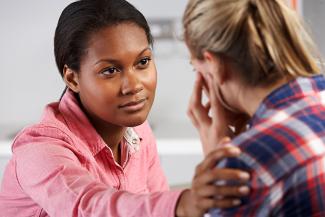
Dr Neena David, a Clinical Psychologist, emphasises the importance of developing positive coping skills, a sense of resilience and a growth mindset among adolescents and teenagers as they have long term positive mental health outcomes and stave off suicidal tendencies.
You have many years of experience in setting up processes for school mental health programmes. What changes did you need to bring about in your programmes over the years?
I am not sure I understand this question- ‘your programmes’- I do not run specific programmes. Among other clinical tasks that I take on, I consult with schools and the nature of that consultation and ensuing strategies/interventions are specific to the school and to issues that they have identified. Suffice to say –as a mental health professional, I need to be responsive and sensitive to changes that occur systemically or at a situational level in a school’s eco system, to offer interventions that are relevant.
Sometimes mental pressures or stress maybe so overwhelming that a teenager may want to end his or her life. Is suicide a natural response to stressful life situations?
There are what we would refer to as appropriate and inappropriate responses to stressful life situations. Suicide is not considered an appropriate response to significant levels of stress. However thinking about wanting to end their lives, thoughts about death as a way to end suffering, are thoughts that are fairly common among people experiencing high stress and feeling overwhelmed as a result of it.
According to WHO, suicides are the second leading cause of death among 15-29 year olds globally.
What are some of the leading stress factors for the millennial generation?
Pressures that are academic, relationships- family/romantic/peers, career and life choices, social acceptance could be viewed as some of the leading stress factors for the millennial generation.
From your experience, who do you think is at greatest risk of dying by suicide?
Important risk factors that we would consider are: Presence of a mental illness such as depression, bipolar disorders; individuals with significant life stressors- such as chronic illness, being in abusive relationships, experiencing loss; limited to absent social support systems and poor coping skills.
At what age should education about suicide prevention start?
Most school programmes would target adolescent populations- middle and high school. However getting children to start actively engaging with identifying their emotions and respond to them in an appropriate manner can begin in early childhood. Constructs such as developing positive coping skills, a sense of resilience and a growth mindset can have their origins in early childhood – these need to be attended to by parents and educators as they have long term positive mental health outcomes.
What are the most common warning signs that somebody is seriously considering suicide?
Changes in mood, tearful, anxious, irritable, angry, low/sad mood, expressing a sense of hopelessness and a loss of control, engaging in self-harming or high risk behaviours, talking/posting information on suicide, dying, death, giving away possessions, low engagement with activities earlier enjoyed.
Is there any connect between tech addiction, deprivation and depression? What do you counsel teenagers about overuse of the internet and social media?
Research has been steadily trickling in over the past few years that are indicating definitive associations between the usage patterns of internet and social media and conditions such as depression, anxiety, sleep deprivation, academic underachievement among other lifestyle concerns such as inadequate physical exercise and faulty diets. The general consensus has been to identify factors such as going beyond just measuring time spent with electronic and social media to exploring what is the adolescent specifically doing in that time – texting friends, playing a game, updating social stats; is time being spent exclusively on these or does he/she have other age appropriate extra- curricular activities and tasks that they continue to show an active interest and sense of engagement with. Research in the area of adolescent brain development cautions us to the vulnerabilities that exist in this period arising from the fact that adolescents are still in the process of practicing skills of self-regulation and are hence far more likely to take risks and struggle with tasks such as delaying gratification, prioritizing, managing time, decision making etc.
An important recognition here that counselling with an adolescent on issues of net overuse, is not about sermonizing – it is about ascertaining how the adolescent views the issue; would he/she feel that it is impacting other areas of functioning? Do they have an understanding of how this plays out in their brains? Are there other issues that the adolescent may be experiencing such as social anxiety, bullying, low sense of self, abuse- that need to be understood? There is therefore a need, I believe, to move from just symptomatically responding to a concern of overuse to a more engaged perspective that involves the adolescent.
Could you list out 5 best ways for a youngster to handle pressure or failures?
I honestly do not feel comfortable with reducing complex ways by which a youngster could handle stress/pressure /failure, to a pop psychology response!
However in working with adolescents on developing appropriate skills of problem solving, we would encourage them to initially identify what they understand as the problem, what are associated thoughts, feelings and behaviours associated with it, are there alternate ways of responding that would perhaps lead to more appropriate and positive outcomes for themselves? Do they need to attend to basic issues of sleep, diet and exercise? Are they aware of their areas of strength? Do they need to actively work on creating stronger family/ social support systems? Would they feel comfortable in accessing help and are they aware of where they can go? This list is by no means comprehensive but it hopefully provides a sense those mechanisms of coping have to be relevant and sensitive to the young person you may be responding to either as a parent, an educator or a mental health professional.

(Dr Neena David is a Clinical Psychologist who works with schools and has an independent practice catering to adults, couples and families.)






